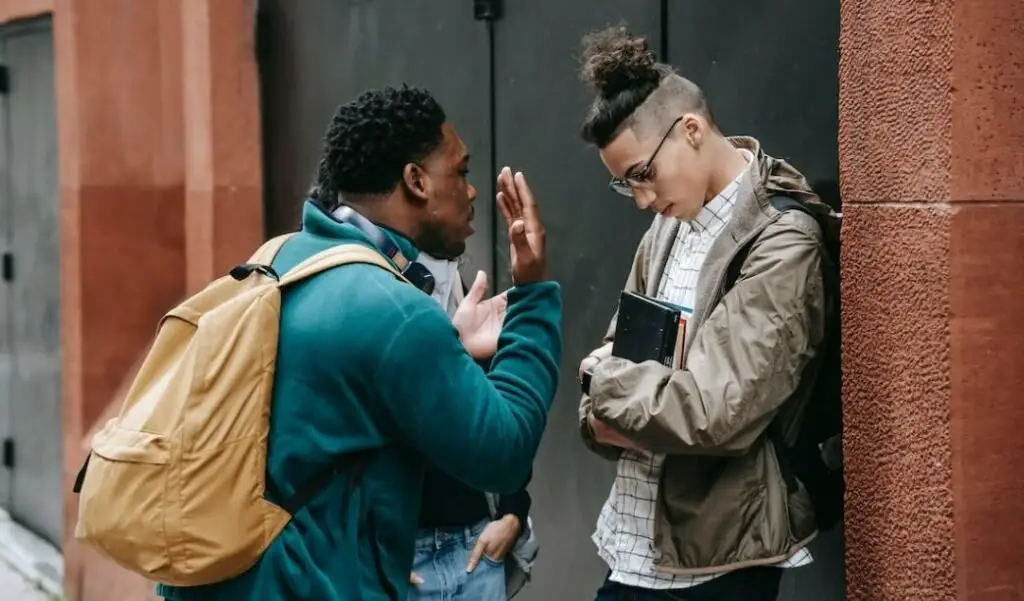Friendship is a beautiful thing. Unfortunately, not all friendships last forever. Sometimes friends drift apart, and one or both of them may end the bond, or the friendship becomes toxic and needs to end.
Whatever the reason, a friendship breakup can be heartbreaking, leaving you in pain and suffering. To move forward, you must learn how to accept that a friendship is over and let go with grace.
That’s what this article will help you do. But first, here’s how to know it’s time to end a friendship.
Knowing When to End a Friendship

Surrounding yourself with good friends is one way to practice self-care. However, psychologists say friendship must provide companionship, emotional support, and a sense of belonging to enrich your life.
Letting go of a friendship can be really tough, but it’s important to recognize the signs and honor your own well-being. It might be time to reassess a friendship or gently bring it to an end if you notice any of these signs.
Lack of Mutual Effort
Effort is a two-way street in healthy friendships. But it’s time to reconsider the friendship if you’re the one always initiating contact, making plans, or putting in more effort while your friend barely lifts a finger.
One-sided relationships aren’t healthy; you deserve a balanced and fulfilling connection. If your friend isn’t putting any effort into the relationship, you might want to seriously consider ending the friendship.
Frequent Negativity and Toxicity
Negative and toxic friends can wreak a lot of havoc in your life. If you find yourself constantly surrounded by negativity, feeling drained, and caught up in never-ending conflicts, it’s a clear sign that this friendship might be doing you more harm than good.
Your happiness and emotional health deserve better; the most practical thing to do is walk away from that friendship.
Growing Apart
Growing apart happens, and that’s okay. We all change and evolve, even researchers acknowledge that not all friendships last forever, and sometimes, friends naturally drift apart.
If you and your friend have different interests, values, or life paths that make it hard to connect and relate, there is no point in forcing the friendship. It’s okay to take it as a sign that it’s time to accept the natural course of things and move on.
Unresolved Conflicts
Conflict after conflict, with no resolution in sight, can be exhausting. When conflicts remain unresolved despite your best efforts to communicate and reconcile, it might be a sign that the friendship has reached its limit.
Realize that some issues just can’t be resolved, especially when it has to do with differences in personal values or life direction misalignment. And the healthiest thing to do when there are unresolved conflicts is to let go of the friendship.
Betrayal and Lack of Trust
Trust is the glue that holds friendships together. But if your friend repeatedly breaks that trust, lies, or undermines the relationship, it’s a clear red flag.
Trust should be the foundation of friendship; without it, maintaining a healthy connection becomes challenging.
Sometimes it’s better to part ways when dealing with an untrustworthy person.
Tips for How to Accept That a Friendship Is Over

1. Allow Yourself to Grieve
When a friendship ends, it’s natural to experience a rollercoaster of emotions. Denying or suppressing these emotions won’t do you any good. In fact, scientific research suggests that suppressing emotions could potentially have negative health consequences.
Instead of suppressing your emotions, here’s what I suggest: give yourself permission to grieve! Let those tears flow if you need to. It’s okay to feel sad, disappointed, or even angry. Allow yourself to acknowledge and process these emotions.
Friendship holds a special place in our hearts, and its loss can be just as painful as any other relationship.
During this grieving process, be patient with yourself. There’s no set timeline for healing, and it’s okay if it takes time.
Remember, grief is not a sign of weakness but a testament to the meaningful bond you once had. It is a necessary step in the process of accepting the end of a friendship and moving forward.
2. Reflect on Why the Friendship Ended
Take some time to dig deep and honestly assess the reasons why the friendship came to an end.
- Was it due to a major disagreement or a series of unresolved conflicts?
- Did you both grow apart, pursuing different paths and developing distinct interests?
- Was there a breach of trust that shattered the foundation of your friendship?
Whatever the reasons, take time to reflect on them without solely blaming yourself or your former friend. Remember to acknowledge your role and recognize the influence of external factors in the course of the friendship.
When you think deeply about why the friendship ended, you gain valuable insights contributing to your growth and understanding. It lets you see the bigger picture and accept the fact that sometimes, friendships simply run their course despite your best efforts.
To get the most out of this introspection, you must be honest with yourself and let the clarity you gain guide you toward accepting the end of the friendship.
3. Don’t Take It Personally
It’s easy to take things personally and put the blame on yourself when a close friendship ends. But the truth is it’s rarely about you.
There are countless reasons why a friendship may come to a close. And many of them have nothing to do with you.
Truth is, life is complex, and people change.
Sometimes, friendships simply run their course or take different paths. Your friend’s decision to end the friendship may be influenced by their own personal circumstances, struggles, growth, or something completely unrelated to you. Shift your perspective instead of internalizing it as a personal failure or rejection.
Here’s an empowering way to look at it:
Other people’s choices and actions are out of your control. Your old friend is responsible for their decisions ― even if the decision is to end their friendship with you. It’s important not to let it define your self-worth or question your value as a friend.
Focus on the things you can control, such as:
- How you respond
- How you grow
- How you continue to nurture other relationships in your life
Recognize that friendships, like any other relationship, require effort and compatibility from both sides. Sometimes, despite your best intentions, the connection simply isn’t meant to last.
By reframing your perspective and not taking the end of the friendship personally, you free yourself from unnecessary guilt, self-doubt, and negative self-talk.
And if you forget every other thing, always keep this in mind: your worth is not determined by the presence or absence of any particular friendship.
4. Seek Support From Other Friends and Loved Ones
Knowing how to accept that a friendship is over involves reaching out to your support network because their support can be a valuable source of comfort and strength in times of transition and emotional healing.
Here’s why seeking support is crucial and how you can go about it:
- Lean on trusted friends and loved ones: Share your feelings and thoughts with those who have shown unwavering support and understanding in the past. Their empathy and reassurance can provide a fresh perspective.
- Express your needs: Communicate your needs to your support network. Open and honest communication will foster a deeper sense of connection, whether you need someone to listen, offer advice, or engage in enjoyable activities together.
- Engage in social activities: Surround yourself with positive people by participating in social activities with other friends and loved ones. Engage in enjoyable experiences to uplift your spirits.
5. Practice Forgiveness and Let Go of Resentment
Holding onto resentment isn’t the best thing to do when a close friendship comes to an end, as it can hinder your healing process and prevent you from moving forward.
Indeed, letting go of resentment isn’t the easiest thing to do. But here are some practical tips to help you with that:
- Cultivate compassion and empathy: Foster compassion and empathy toward yourself and your former friend. Recognize that everyone has their own journey, struggles, and limitations. When you cultivate compassion, you release resentment and foster a sense of peace within yourself.
- Practice forgiveness: To forgive doesn’t mean putting up with hurtful actions, and neither does it necessarily mean reconciling with the person who caused the pain. Instead, it’s a conscious decision to release the negative emotions associated with ending the friendship. When you forgive, you free yourself from the burdens of resentment and create space for healing.
- Letting go and moving forward: Once you forgive, it’s time to let go and move forward. Focus on self-care, personal growth, and nurturing other meaningful relationships in your life.
Final Thoughts
Knowing how to accept that a friendship is over is never easy. Friendship breakups are a process; it takes time to come to terms with it, especially if it was a close friend.
But remember, it’s okay to listen to your instincts and prioritize your own well-being. Letting go doesn’t erase the memories and moments you shared. It simply means creating space for new connections and personal growth.




